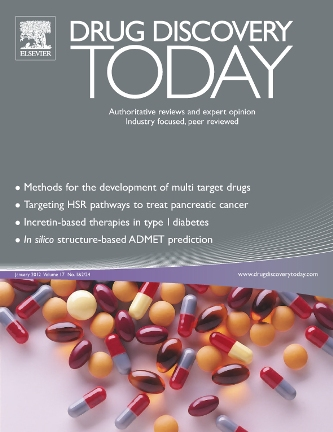Artificial intelligence in peptide-based drug design
IF 6.5
2区 医学
Q1 PHARMACOLOGY & PHARMACY
引用次数: 0
Abstract
Protein–protein interactions (PPIs) are fundamental to a variety of biological processes, but targeting them with small molecules is challenging because of their large and complex interaction interfaces. However, peptides have emerged as highly promising modulators of PPIs, because they can bind to protein surfaces with high affinity and specificity. Nonetheless, computational peptide design remains difficult, hindered by the intrinsic flexibility of peptides and the substantial computational resources required. Recent advances in artificial intelligence (AI) are paving new paths for peptide-based drug design. In this review, we explore the advanced deep generative models for designing target-specific peptide binders, highlight key challenges, and offer insights into the future direction of this rapidly evolving field.
人工智能在肽类药物设计中的应用。
蛋白质-蛋白质相互作用(PPIs)是多种生物过程的基础,但由于其大而复杂的相互作用界面,用小分子靶向它们是具有挑战性的。然而,肽已成为极有希望的PPIs调节剂,因为它们可以以高亲和力和特异性结合到蛋白质表面。尽管如此,计算肽设计仍然很困难,受到肽固有的灵活性和所需的大量计算资源的阻碍。人工智能(AI)的最新进展为基于肽的药物设计铺平了新的道路。在这篇综述中,我们探讨了用于设计目标特异性肽结合物的先进的深度生成模型,突出了关键挑战,并对这一快速发展领域的未来方向提供了见解。
本文章由计算机程序翻译,如有差异,请以英文原文为准。
求助全文
约1分钟内获得全文
求助全文
来源期刊

Drug Discovery Today
医学-药学
CiteScore
14.80
自引率
2.70%
发文量
293
审稿时长
6 months
期刊介绍:
Drug Discovery Today delivers informed and highly current reviews for the discovery community. The magazine addresses not only the rapid scientific developments in drug discovery associated technologies but also the management, commercial and regulatory issues that increasingly play a part in how R&D is planned, structured and executed.
Features include comment by international experts, news and analysis of important developments, reviews of key scientific and strategic issues, overviews of recent progress in specific therapeutic areas and conference reports.
 求助内容:
求助内容: 应助结果提醒方式:
应助结果提醒方式:


